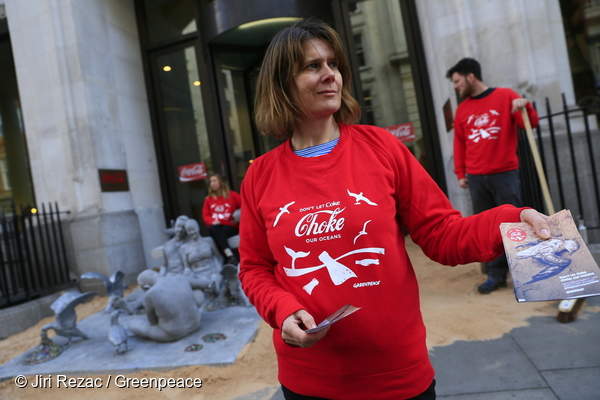
In July, Coca-Cola GB announced its new recycling strategy, including a call for a UK-wide reform in plastic recycling, and a pledge to up the amount of recycled plastic in their bottles from 25% to 50%, as well as a televised ad campaign. According to campaigners from Greenpeace though, Coke’s announcement doesn’t go nearly far enough.
Greenpeace is on a global push for Coke to reform their practises, and reduce their plastic footprint. The #Choke campaign began in the UK, but has since graduated to a global movement for the organisation. A petition raised by Greenpeace received over 130,000 signatories in the first week, and campaigners have sent over 90,000 emails to Coca-Cola’s European CEO asking for change.
Greenpeace UK oceans campaigner Tisha Brown responds to Coca-Cola GB’s announcement of a new approach to plastic, and details why she feels the organisation needs to be doing more.
Elliot Gardner: What do you say to Coca-Cola GB’s call of a UK-wide recycling system overhaul?
Tisha Brown: An efficient recycling system is crucial, as individuals need to do their part to ensure plastic doesn’t end up in the environment. But soft drinks companies also need to use less plastic. They have to be responsible for the end life of their products and stop shifting the blame to the consumer or government.
EG: Coke is currently the biggest user of recycled plastic in the UK – is this an achievement or should they be doing more?
TB: Coca-Cola needs to do more. They are still churning out 110 billion single-use plastic bottles globally every year – and the number has gone up from last year. This is contributing to a major pollution crisis with up to 12 million tonnes of plastic entering our ocean every year. Plastic bottles are one the most commonly found items during beach cleans, and on the ocean’s surface. We want to see Coca-Cola reduce their plastic footprint by switching to refillable bottles or new delivery systems like the smart fountains that they are trialling at the University of Reading.
EG: What’s more important? An effective recycling strategy or more considerate design?
TB: To end ocean plastic pollution, we need everyone from governments, to individuals, to the soft drinks industry to do their bit. Governments need to pass legislation like deposit return schemes to increase the collection of plastic bottles for recycling. Individuals need to reduce their personal plastic footprint by using refillable bottles, bringing their own shopping bags and refusing to use straws. And the soft drinks industry needs to reduce their plastic footprint by finding new ways to deliver their products.
EG: Tell me more about the #Choke campaign – what are you asking of Coca-cola, and how successful have you been so far?
TB: Coca-Cola are the world’s largest soft drinks company, producing billions of single-use plastic bottles every year. They cannot wash their hands of our growing plastic problem. We’re asking them to reduce their plastic footprint by looking at new and innovative delivery systems for their products.
Concerns about the amount of plastic waste ending up in our oceans are growing, and Coke is definitely feeling the pressure. They have committed to using more recycled plastic in the bottles they produce here. They also abandoned their previous opposition to a deposit-return scheme in Scotland after we revealed they were secretly lobbying against it, and they now support a UK-wide scheme. But our oceans know no boundaries, which is why we’ve taken our campaign global and have supporters from across five continents calling on Coke’s global CEO to do more to end ocean plastics.
EG: Is beach and ocean plastic the main concern, or just a symptom of something larger?
TB: The litter we see on the beach really is the tip of a very large plastic iceberg. We know that microplastics are extremely long-lived and extremely mobile within the natural environment. They are just about everywhere, and in constantly increasing numbers. What we don’t know is how much of a health threat they pose to marine ecosystems, and to humans. We urgently need more research on this, and if there are significant risks we may need to take far more radical action than the proposals currently on the table.
EG: What do you say to the company taking up the Ellen MacArthur Foundation’s pledge of 100% recyclable packaging by 2025?
TB: It’s good that Coca-Cola is now working to ensure all of their products are 100% recyclable. But 8 years is an incredibly long time to achieve this goal. By the time Coca-Cola has achieved this goal, almost 80 million tonnes of additional plastic will have polluted the sea.



